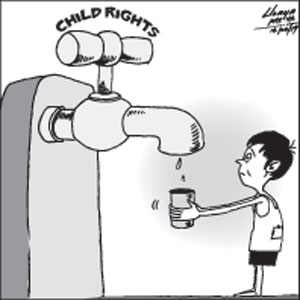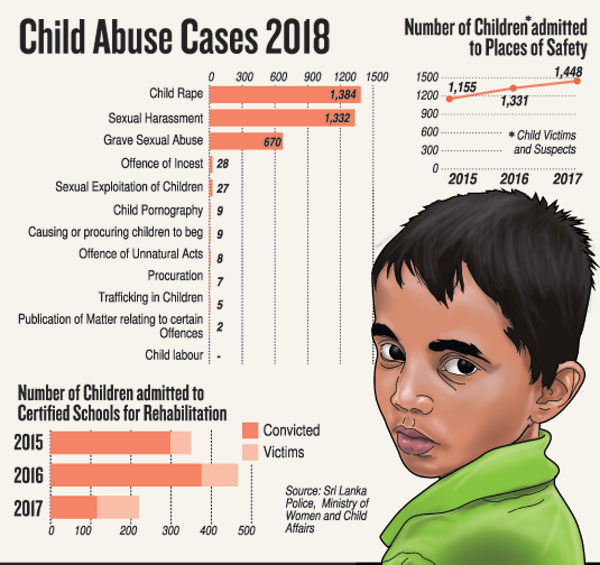News
State has no plan to tackle child prostitution and porn, UN body finds
Despite Sri Lanka being recognised as a pathfinder country to end violence against children and is in its final stages of developing a national child protection policy, it lacks a comprehensive national plan to address the issues, a UN report said.
 The United Nations Committee on the Rights of the Child has published its concluding observations on the report submitted by Sri Lanka on the Optional Protocol II adopted on the convention of rights of the child in relation to sale of children, child prostitution, and child pornography.
The United Nations Committee on the Rights of the Child has published its concluding observations on the report submitted by Sri Lanka on the Optional Protocol II adopted on the convention of rights of the child in relation to sale of children, child prostitution, and child pornography.
The committee recommendations include the development of a national plan to address issues under the OP while providing adequate human and financial resources for its implementation, monitoring and evaluation.
The committee which met in May 21, 2019, in its findings has outlined its observations on the implementation of the Convention on the Rights of the Child and its Optional Protocol where it has expressed concern over the government’s lack of a concise and centralized data collection system on the OP.
It said that although the databases on reported complaints are maintained by the National Child Protection authority (NCPA) and the Police Women and Children’s Bureau, the process needs to be adequately disaggregated in relation to the offences under the OP.
This it said, is adversely affecting the actual assessment and magnitude of the problem the country is facing in terms of sale of children, child prostitution and child pornography in the travel and tourism industry, in the alternative care and religious institutions, in the community, in the home and in the social media.
The committee said that although Sri Lanka has made provisions of the Convention and OP integrating them into the Children’s Charter of 1992 and the Penal Code of 1883 to prohibiting several offences against the rights of the child it does not effectively address recommendations made by the OP.

The OP explicitly says that sale of children, child prostitution, child pornography and sexual exploitation of children in travel and tourism be sufficiently addressed in national legislation and urges that all acts and activities mentioned in the OP be included in the domestic criminal law.
In the sphere of co-ordination, the committee recommends that the National NCPA, which has been given the right to co-ordinate the activities of the committee, be strengthened with more resources to provide leadership and effective oversight for monitoring and evaluation of activities on children’s rights.
Also concerns have been raised over the establishment of the National Monitoring Committee and the Presidential Task Force for the Protection of Children. The committee views this as a duplication and overlapping of the NCPA functions.
The report said that the current polices have failed to address multiple problems including the root causes to the increasing number of children, including boys, being sexually exploited by locals and foreigners, sale of boys by their families for sexual exploitation, children in forced labour and trafficking.
The recommendations include undertaking research, assessing the magnitude of the problem and developing policies and programmes that include poverty reduction, intervention, and awareness.
Although the government in its statistics forwarded to the committee has indicated that no child marriages were reported in the three years, namely, 2016, 2017 and 2018, the committee chose to differ and said that despite the legally-set marriage age of 18 years, child marriages are prevalent in the country, sometimes even equivalent to the sale of children.
With regard to the prevalence of child sex, the committee charged the government of not sufficiently engaging the travel and tourism industry to combat the problem. It conceded that there is lack of data to assess the scope of the exploitation and the impunity enjoyed by perpetrators.
To address the problem, the recommendations include conducting advocacy for the tourism industry on the harmful effects of the problem and including them as signatories to the code of conduct for the protection of children. Other measures include identifying vulnerable children from poverty stricken homes and monitoring the flow of foreigners into the country and surveillance of unregistered tourist accommodations and engaging the industry in the prevention, monitoring and reporting of cases.
As for online child sexual exploitation and abuse, the committee charged that Sri Lanka once again has failed to gather data to assess the extent of the problem due to its limited engagement and failure to regulate the communications and technology sector.
The committee recommends the creation of a national policy and a legal framework to prevent and respond to online child sexual exploitation and abuse. Also it encourages a victim-focused criminal justice system and a national database linked to the Interpol database to arrest offenders.
It says this will enable collection of data on how children access and use digital and social media and their impact on their lives and safety.
In conclusion, the committee urges the government to review its penal code to make it comply with the OP by criminalising the sale of children, child prostitution and child pornography, and prohibit child and forced marriages.

